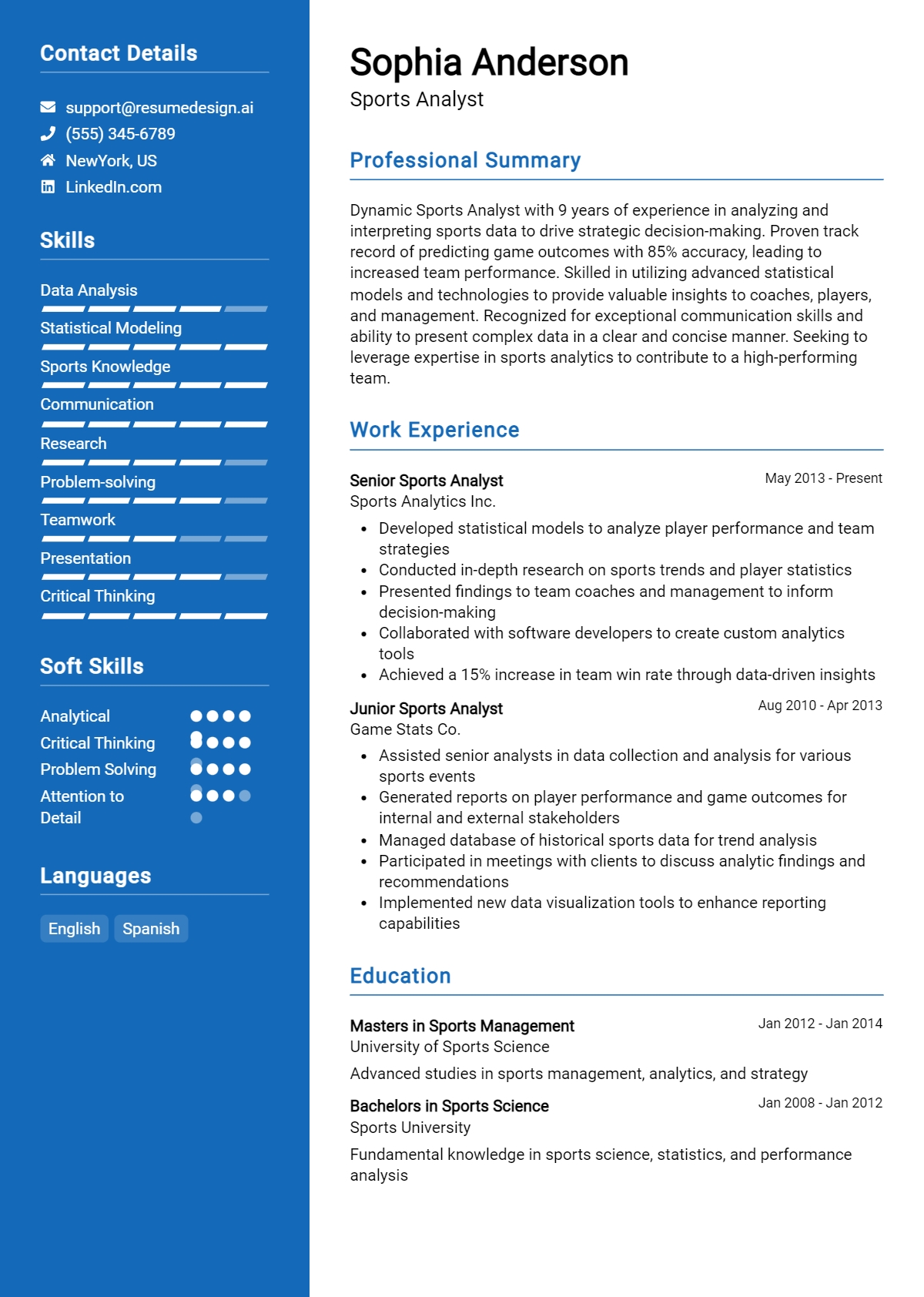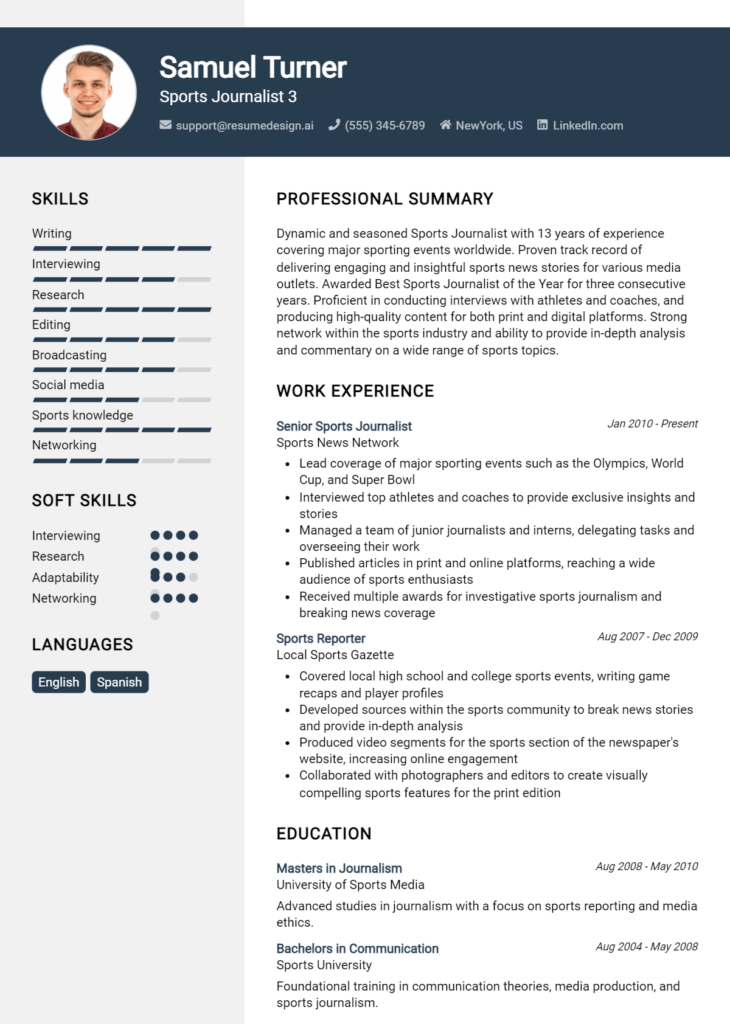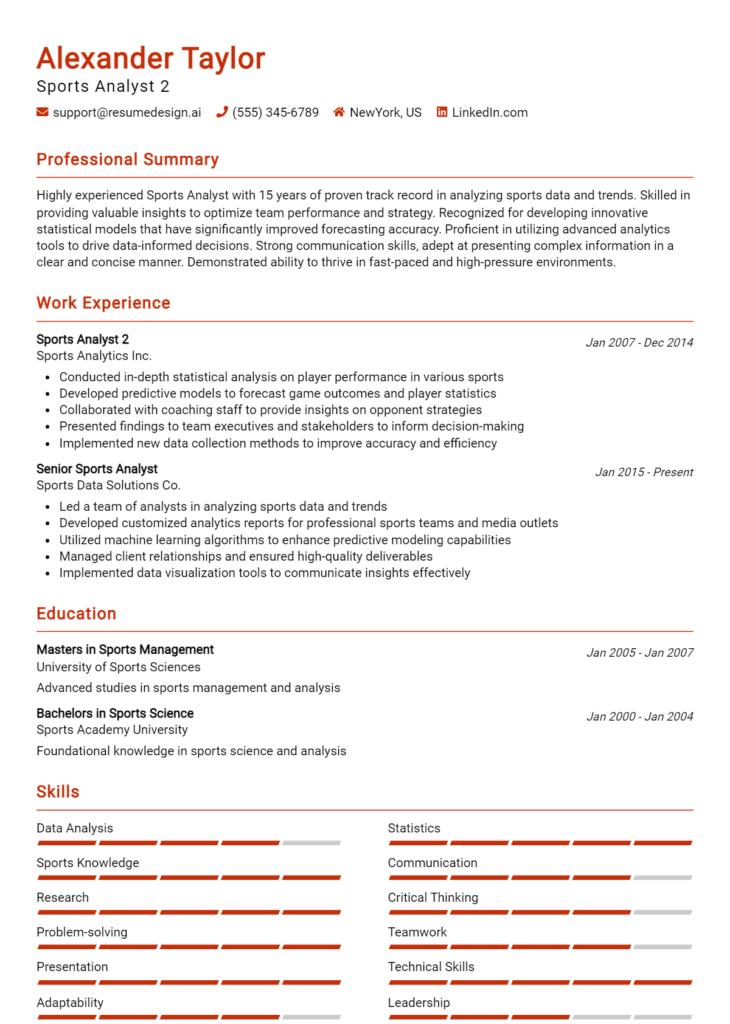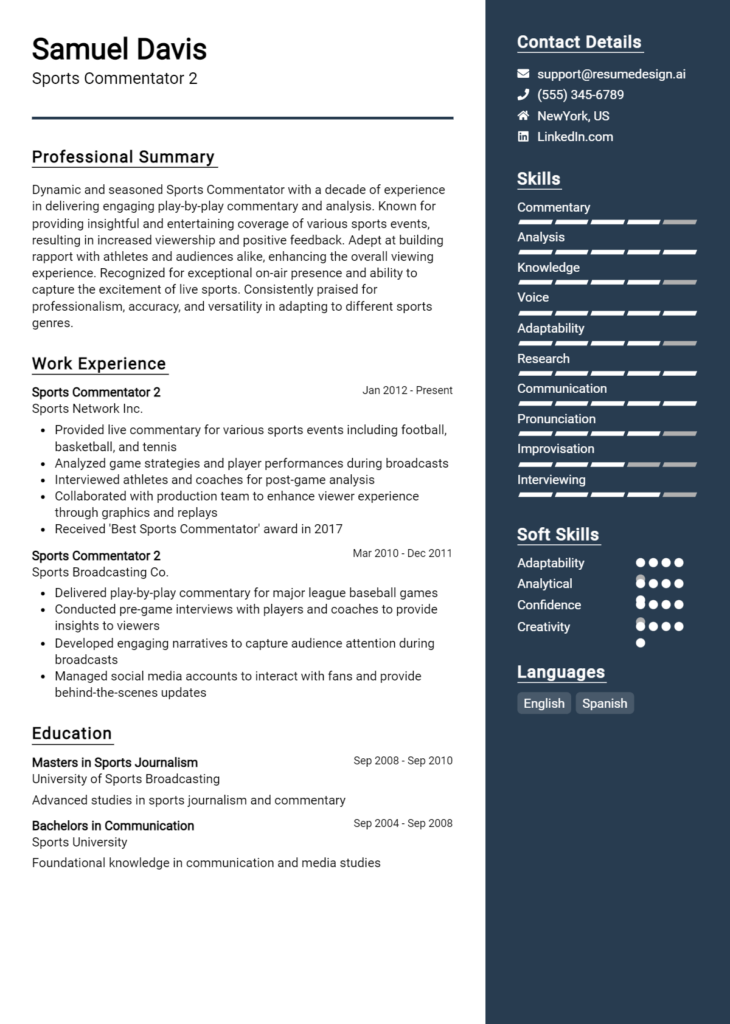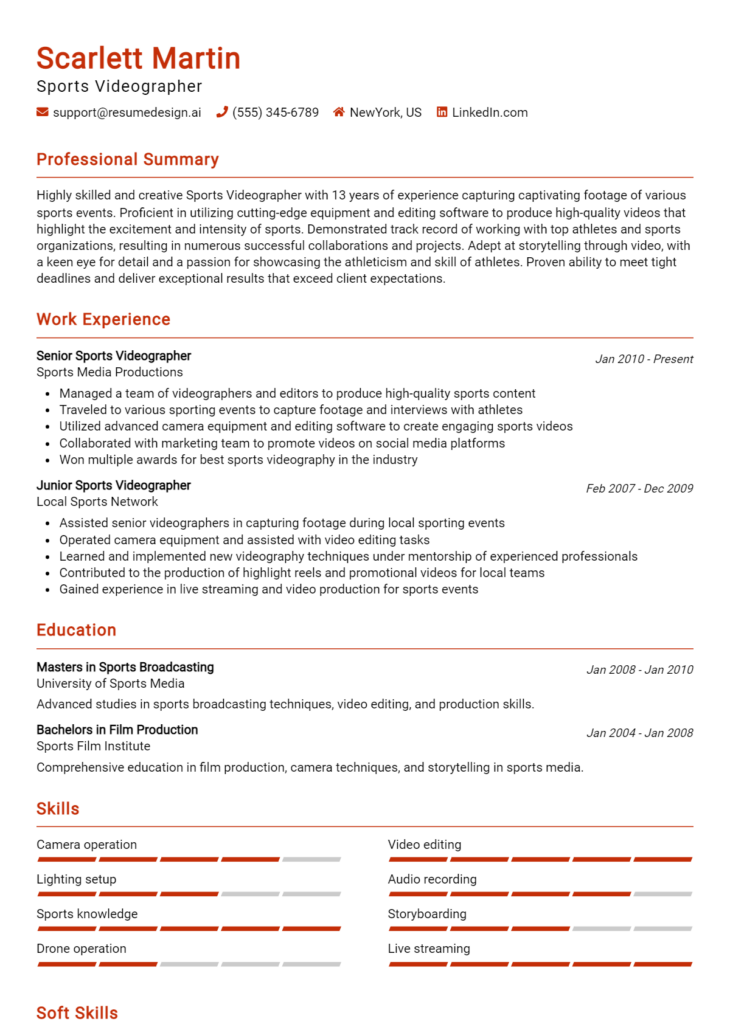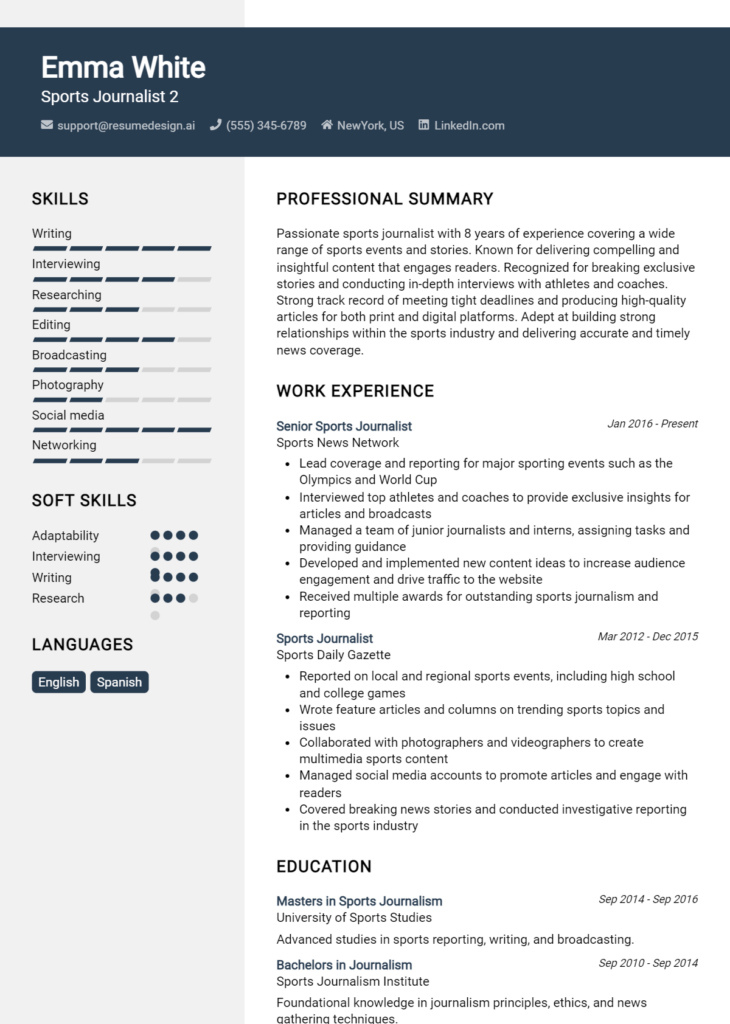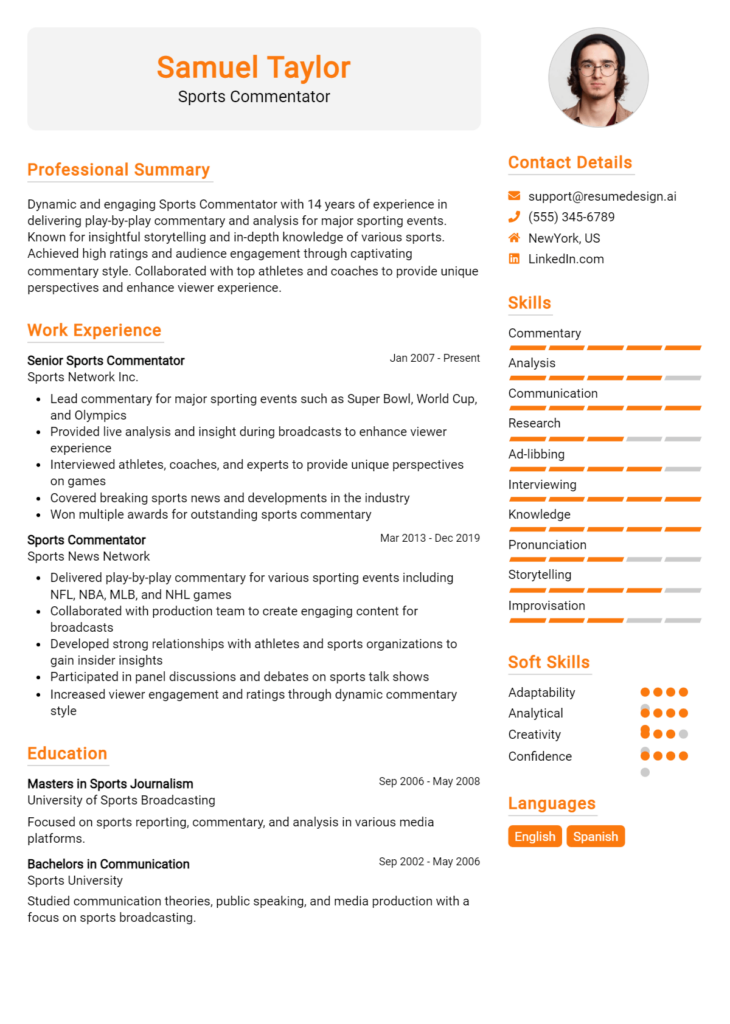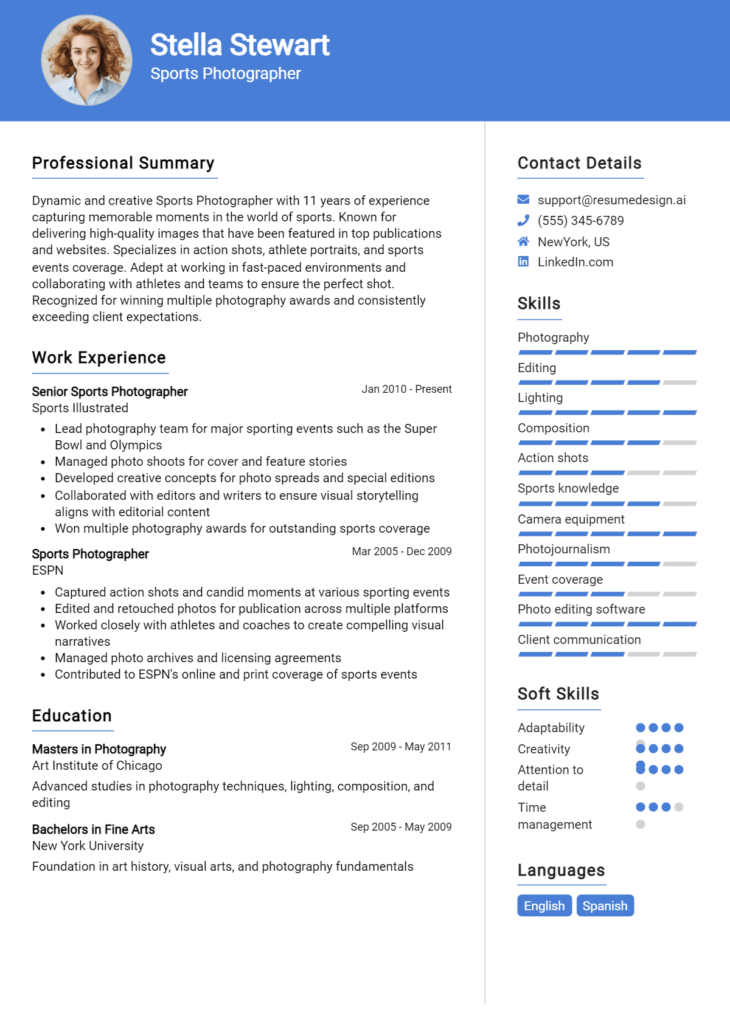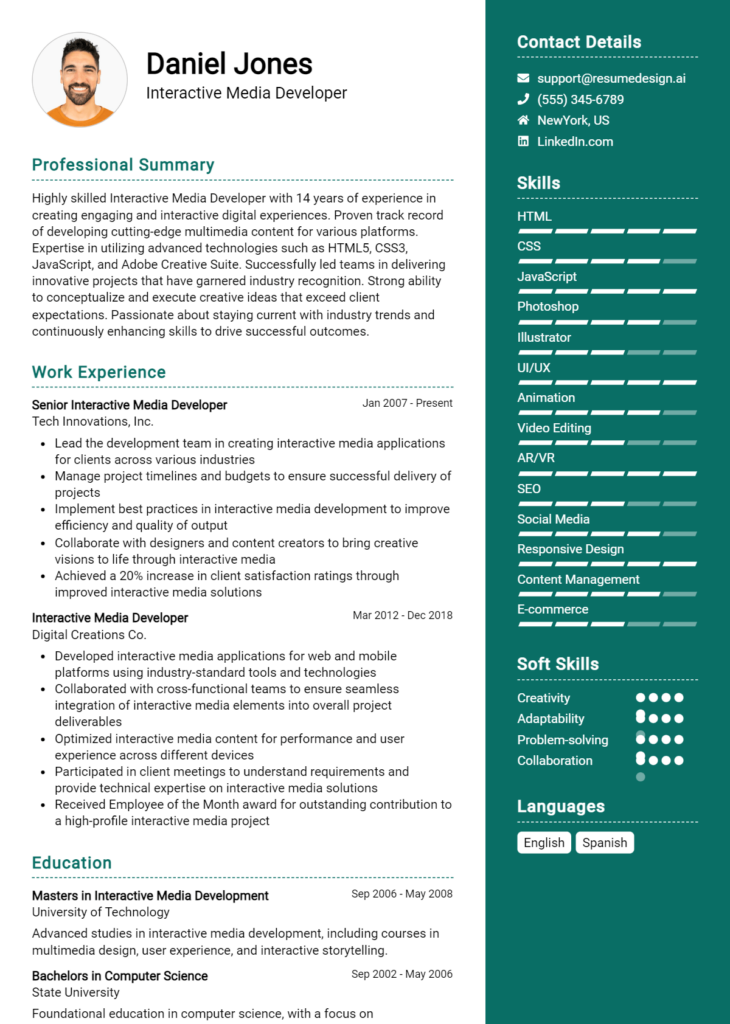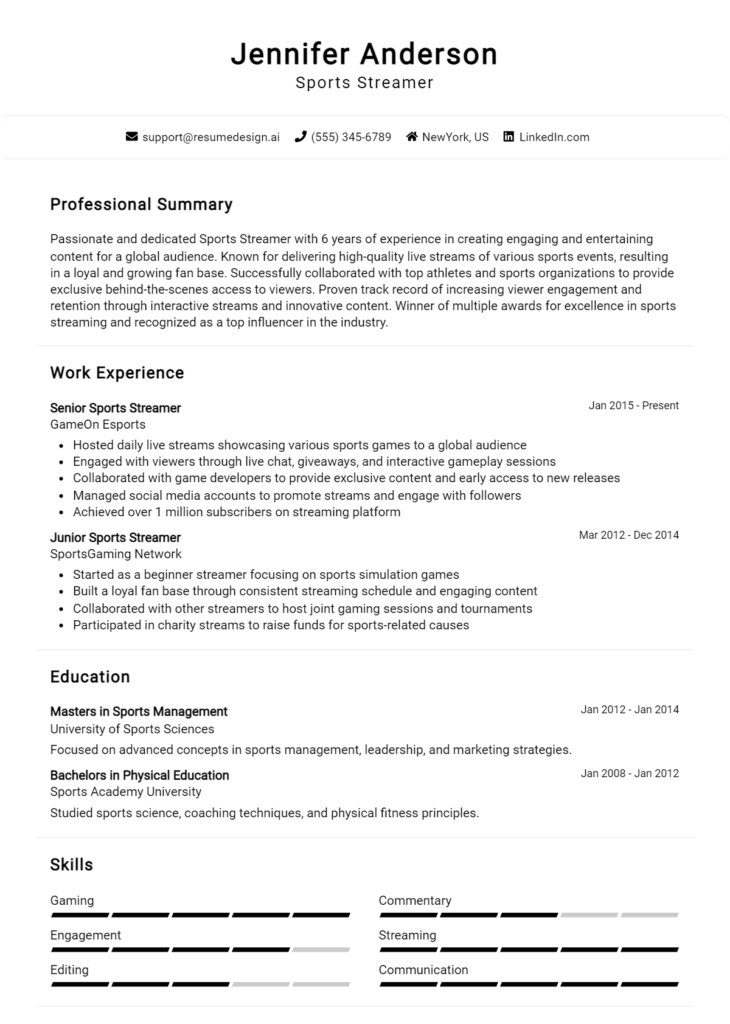Sports Analyst Core Responsibilities
A Sports Analyst plays a crucial role in evaluating team performance and developing strategies by leveraging data analysis, technical skills, and problem-solving abilities. This position often acts as a bridge between coaching staff, management, and marketing departments, ensuring insights are effectively communicated across functions. Strong analytical capabilities and operational understanding are essential for aligning sports strategies with organizational goals. A well-structured resume can highlight these qualifications, showcasing the candidate's ability to contribute meaningfully to the team's success.
Common Responsibilities Listed on Sports Analyst Resume
- Analyze game statistics and player performance metrics.
- Prepare detailed reports and presentations for coaching staff.
- Conduct competitor analysis and trend forecasting.
- Collaborate with coaches to develop tactical strategies.
- Utilize software tools for data visualization and analysis.
- Monitor player health and performance metrics.
- Support recruitment efforts through performance analysis.
- Assist in budget management for sports operations.
- Engage with media to discuss analytical insights.
- Stay updated on industry trends and technological advancements.
- Train staff on data analysis tools and methodologies.
High-Level Resume Tips for Sports Analyst Professionals
A well-crafted resume is crucial for Sports Analyst professionals, serving as the first impression a candidate makes on potential employers. In a competitive field where analytical skills and industry knowledge are paramount, your resume must not only showcase your qualifications but also reflect your unique achievements and contributions to the sports industry. This guide will provide practical and actionable resume tips specifically tailored for Sports Analyst professionals, enabling you to stand out in a crowded job market.
Top Resume Tips for Sports Analyst Professionals
- Tailor your resume to each job description by incorporating relevant keywords and phrases.
- Highlight your experience with data analysis tools and software commonly used in the industry.
- Quantify your achievements with specific metrics, such as improved team performance or increased viewer engagement.
- Showcase your understanding of sports statistics, trends, and historical data analysis.
- Include any relevant certifications or training, such as sports analytics courses or workshops.
- Emphasize soft skills such as communication, teamwork, and critical thinking, which are essential for collaboration in sports environments.
- List your experience with creating reports, presentations, or data visualizations that effectively communicate your findings.
- Utilize a clean and professional format, ensuring that your resume is easy to read and navigate.
- Incorporate a brief summary statement at the top that captures your career goals and unique value proposition.
By implementing these tips, you can significantly increase your chances of landing a job in the Sports Analyst field. A resume that effectively communicates your skills, experiences, and accomplishments will not only capture the attention of hiring managers but also set the stage for successful interviews and career advancement in the exciting world of sports analysis.
Why Resume Headlines & Titles are Important for Sports Analyst
In the competitive field of sports analysis, having a well-crafted resume headline or title is crucial for standing out to hiring managers. A strong headline can immediately grab attention and succinctly summarize a candidate's key qualifications in a single, impactful phrase. It serves as a first impression, setting the tone for the rest of the resume. Therefore, it's essential that the headline is concise, relevant, and directly aligned with the job being applied for, ensuring that it captures the essence of the candidate's expertise in sports analysis.
Best Practices for Crafting Resume Headlines for Sports Analyst
- Keep it concise and to the point, ideally within 10 words.
- Use industry-specific terminology that resonates with hiring managers.
- Highlight your most relevant skills and achievements.
- Tailor the headline to the specific job description you are applying for.
- Avoid generic phrases; be specific about your unique qualifications.
- Incorporate measurable results or impactful contributions when possible.
- Showcase your passion for sports and data analysis in a compelling way.
- Utilize strong action verbs to convey confidence and dynamism.
Example Resume Headlines for Sports Analyst
Strong Resume Headlines
Data-Driven Sports Analyst with 5 Years of Experience in Performance Metrics
Proven Sports Analyst Specializing in Player Statistics and Game Strategy Optimization
Expert Sports Analyst with a Track Record of Enhancing Team Performance through Data Insights
Dynamic Sports Analyst with Expertise in Predictive Analytics and Game Trends
Weak Resume Headlines
Sports Analyst Seeking Opportunities
Experienced Analyst in Sports
Passionate About Sports and Analysis
Strong headlines are effective because they immediately communicate the candidate's expertise, experience, and unique value proposition, making them stand out in a crowded job market. They utilize specific language and measurable accomplishments that resonate with hiring managers looking for qualified candidates. In contrast, weak headlines fail to impress as they are vague, lack specificity, and do not convey any unique attributes or qualifications, making it difficult for employers to discern the candidate's potential contributions to their organization.
Writing an Exceptional Sports Analyst Resume Summary
A well-crafted resume summary is a critical component for any Sports Analyst seeking to make a strong impression on potential employers. This brief yet impactful statement serves as the first opportunity to highlight key skills, relevant experience, and significant accomplishments that align with the job role. A strong summary can quickly capture the attention of hiring managers, providing them with a snapshot of the candidate’s qualifications and setting the tone for the rest of the resume. It should be concise, impactful, and tailored to the specific job being applied for, ensuring that it resonates with the needs of the organization.
Best Practices for Writing a Sports Analyst Resume Summary
- Quantify achievements: Use numbers and statistics to demonstrate your impact in previous roles.
- Focus on relevant skills: Highlight the skills most pertinent to the job description, such as data analysis, statistical modeling, or sports forecasting.
- Tailor the summary: Customize your summary for each application, reflecting the specific requirements and language of the job posting.
- Keep it concise: Aim for 2-4 sentences that deliver maximum information in a digestible format.
- Use strong action verbs: Begin sentences with dynamic verbs that convey your contributions, such as "analyzed," "developed," or "optimized."
- Highlight industry knowledge: Mention specific sports or analytical tools you are familiar with to establish credibility.
- Avoid jargon: While industry terms are important, ensure that your summary is easily understandable to a broad audience.
- Showcase unique value: Identify what sets you apart from other candidates, whether it's a specialized skill set or a notable achievement.
Example Sports Analyst Resume Summaries
Strong Resume Summaries
Data-driven Sports Analyst with over 5 years of experience in analyzing player performance metrics, resulting in a 20% increase in team efficiency. Proficient in advanced statistical analysis and predictive modeling, with a proven track record of delivering actionable insights to coaching staff.
Results-oriented Sports Analyst skilled in utilizing machine learning algorithms to forecast game outcomes. Successfully developed a predictive model that improved betting accuracy by 15% and gained recognition for innovative game analysis in regional sports conferences.
Dedicated Sports Analyst with expertise in basketball analytics, having led a team project that identified key performance indicators resulting in a 30% improvement in player recruitment strategies. Strong background in data visualization tools, enabling clear communication of complex data to stakeholders.
Weak Resume Summaries
I have experience in sports analysis and can help teams perform better. I am good with data and enjoy working in sports.
Sports Analyst with some experience in the field. I am passionate about sports and have worked with various teams.
The strong resume summaries stand out because they include quantifiable achievements, specific skills relevant to the sports analysis field, and a clear connection to the job role. They demonstrate the candidate's ability to contribute effectively and provide concrete examples of past successes. Conversely, the weak summaries lack detail and specificity, failing to communicate any measurable impact or unique qualifications, which can leave hiring managers unimpressed and uncertain about the candidate's capabilities.
Work Experience Section for Sports Analyst Resume
The work experience section of a Sports Analyst resume is a critical component that provides potential employers with insight into a candidate's technical skills, team management capabilities, and ability to deliver high-quality products. This section not only highlights relevant job roles and responsibilities but also quantifies achievements, demonstrating the candidate's impact on previous teams and organizations. Aligning experience with industry standards and showcasing a track record of success is crucial for standing out in a competitive job market.
Best Practices for Sports Analyst Work Experience
- Highlight technical skills relevant to data analysis, such as proficiency in statistical software and programming languages.
- Quantify achievements with specific metrics, such as percentage increases in team performance or accuracy of predictions.
- Describe leadership experience, focusing on managing projects or teams effectively.
- Include collaboration examples, emphasizing teamwork in cross-functional projects.
- Tailor experience descriptions to align with job descriptions in the sports industry.
- Showcase continuous learning and adaptability by mentioning relevant certifications or training.
- Utilize action verbs to convey a sense of initiative and impact in previous roles.
- Keep descriptions concise and focused, ensuring clarity and readability for hiring managers.
Example Work Experiences for Sports Analyst
Strong Experiences
- Led a data analytics team that improved player performance metrics by 25%, resulting in a playoff berth.
- Developed predictive models that accurately forecasted game outcomes with a 90% success rate, enhancing strategic decision-making.
- Collaborated with coaching staff to implement data-driven training programs, increasing team efficiency by 15%.
- Presented comprehensive reports on player analytics to stakeholders, receiving commendation for clarity and actionable insights.
Weak Experiences
- Worked on various projects without specifying outcomes or responsibilities.
- Assisted in data collection for team analysis, with little detail on the impact of the work.
- Participated in meetings regarding team performance without demonstrating specific contributions.
- Involved in general sports analysis tasks that do not highlight unique skills or achievements.
The examples provided illustrate the distinction between strong and weak experiences. Strong experiences are characterized by specific, quantifiable outcomes and a clear demonstration of technical expertise and leadership. They reflect a candidate's ability to impact team performance positively and communicate effectively with stakeholders. In contrast, weak experiences lack detail and measurable results, failing to convey the candidate's skills or contributions to previous roles effectively.
Education and Certifications Section for Sports Analyst Resume
The education and certifications section of a Sports Analyst resume is vital as it showcases the candidate's academic background and commitment to professional development in a competitive field. This section highlights relevant degrees, industry-recognized certifications, and continuous learning efforts that demonstrate the candidate's expertise and dedication to staying current with industry trends. By providing specific coursework, certifications, and any specialized training, candidates can significantly enhance their credibility and align their qualifications with the demands of the job role.
Best Practices for Sports Analyst Education and Certifications
- Prioritize relevant degrees in fields such as Sports Management, Statistics, or Data Analytics.
- Include industry-recognized certifications like Certified Sports Analyst (CSA) or similar credentials.
- Highlight specialized training programs that cover advanced analytics, data visualization, or sports technology.
- Provide specific coursework that directly relates to sports analytics, such as Sports Statistics or Performance Analysis.
- Use clear and concise formatting to ensure easy readability and quick reference for hiring managers.
- Update the section regularly to reflect new qualifications or completed training that enhances your skill set.
- Consider including any relevant extracurricular activities or projects that demonstrate practical application of your knowledge.
- Tailor the education and certifications section to match the specific requirements or preferences stated in the job description.
Example Education and Certifications for Sports Analyst
Strong Examples
- Bachelor of Science in Sports Management, University of XYZ, 2020
- Certified Sports Analyst (CSA), National Sports Analytics Association, 2021
- Advanced Data Analytics in Sports Certification, ABC Training Institute, 2022
- Relevant Coursework: Sports Statistics, Performance Metrics, and Data Visualization Techniques
Weak Examples
- Bachelor of Arts in History, University of ABC, 2015
- Certification in Basic Microsoft Office, 2018
- Online Course on General Marketing Strategies, 2019
- High School Diploma, Graduated 2012
The strong examples are considered effective because they align closely with the skills and knowledge necessary for a Sports Analyst role, showcasing relevant degrees, certifications, and coursework that directly contribute to the candidate's ability to succeed in the field. In contrast, the weak examples lack relevance to sports analytics, featuring outdated or unrelated qualifications that do not demonstrate the candidate's preparedness for the job, thereby diminishing their overall credibility in a competitive market.
Top Skills & Keywords for Sports Analyst Resume
A well-crafted resume is crucial for any sports analyst looking to stand out in a competitive job market. Highlighting relevant skills not only demonstrates a candidate's expertise but also showcases their ability to analyze data, interpret trends, and provide actionable insights. A strong skills section can significantly enhance a resume, making it more appealing to hiring managers and recruiters. Whether it's through soft skills that reflect communication and teamwork or hard skills that emphasize technical proficiency, a comprehensive approach to skills can set candidates apart from the competition.
Top Hard & Soft Skills for Sports Analyst
Soft Skills
- Analytical Thinking
- Communication Skills
- Team Collaboration
- Problem-Solving
- Adaptability
- Attention to Detail
- Time Management
- Critical Thinking
- Decision-Making
- Interpersonal Skills
Hard Skills
- Data Analysis
- Statistical Software Proficiency (e.g., R, SPSS)
- Sports Analytics Tools (e.g., Tableau, Python)
- Database Management
- Performance Metrics Evaluation
- Predictive Modeling
- Research Skills
- Knowledge of Sports Rules and Regulations
- Report Writing
- Excel Proficiency
By focusing on both soft and hard skills, sports analysts can create a well-rounded resume that effectively illustrates their qualifications. For more information on how to enhance your skills section or to showcase your work experience, be sure to explore additional resources.
Stand Out with a Winning Sports Analyst Cover Letter
Dear Hiring Manager,
I am excited to apply for the Sports Analyst position at [Company Name], as advertised on [Job Board/Company Website]. With a solid background in sports analytics and a passion for data-driven decision-making, I am confident that my skills and experience align perfectly with the requirements of this role. My educational background in Sports Management and Statistics, combined with hands-on experience in data collection and analysis, positions me to contribute effectively to your team.
In my previous role at [Previous Company], I was responsible for analyzing player performance metrics, game statistics, and overall team efficiency to provide actionable insights for coaching staff and management. I developed comprehensive reports highlighting trends and patterns that informed strategic decisions during the season. My proficiency in statistical software, such as R and Python, allowed me to create predictive models that enhanced our understanding of player potential and game outcomes. I am particularly proud of a project where I identified key performance indicators that led to a significant improvement in our team’s win rate.
Moreover, my ability to communicate complex data in an accessible manner has been instrumental in fostering collaboration between analysts, coaches, and management. I firmly believe that data should drive decision-making, and I enjoy translating numbers into narratives that resonate with stakeholders. I am eager to bring my analytical skills and my passion for sports to [Company Name], helping your team maximize performance and achieve its goals.
Thank you for considering my application. I look forward to the opportunity to discuss how my background, skills, and enthusiasm for sports analytics can benefit [Company Name]. I am eager to contribute to your team and help drive success through data-informed strategies.
Sincerely,
[Your Name]
[Your Contact Information]
Common Mistakes to Avoid in a Sports Analyst Resume
When crafting a resume for a Sports Analyst position, it's essential to present your skills and experiences effectively to stand out in a competitive field. However, many candidates make common mistakes that can undermine their chances of landing an interview. By avoiding these pitfalls, you can create a clearer, more impactful resume that highlights your analytical abilities and sports knowledge.
Lack of Specificity: Failing to include specific achievements or metrics can make your resume feel generic. Instead, quantify your contributions, such as "analyzed player performance data leading to a 15% improvement in team strategy."
Ignoring Relevant Skills: Sports analysis requires a unique set of skills, including statistical analysis, data visualization, and knowledge of sports trends. Omitting these can make you appear unqualified for the role.
Overly Technical Language: While industry jargon can be useful, using overly complex terms without explanation can alienate hiring managers. Strive for clarity and ensure your resume is accessible to a wider audience.
Neglecting Formatting: A cluttered or poorly organized resume can distract from your qualifications. Use clear headings, bullet points, and consistent formatting to make it easy to read.
Not Tailoring the Resume: Sending out the same resume for multiple positions can be detrimental. Customize your resume to fit the specific job description and highlight the most relevant experiences for each application.
Failure to Showcase Soft Skills: While technical skills are crucial, soft skills like communication, teamwork, and problem-solving are equally important in sports analysis. Be sure to include examples that demonstrate these qualities.
Omitting Professional Development: Not mentioning relevant certifications, courses, or workshops can suggest a lack of commitment to professional growth. Include any additional training or education that enhances your qualifications.
Ignoring the Cover Letter: Some applicants overlook the cover letter, thinking it’s unnecessary. A well-crafted cover letter can complement your resume by providing context and showcasing your passion for sports analysis.
Conclusion
As a Sports Analyst, your role is crucial in interpreting data, evaluating player performance, and providing insights that contribute to team strategies. Throughout this article, we've explored the essential skills required for success in this position, including proficiency in statistical analysis, understanding of sports strategies, and the ability to communicate insights effectively.
We've also discussed the importance of staying updated with industry trends and tools that enhance your analysis capabilities. In a competitive job market, having a polished resume that highlights your achievements and skills is vital.
Now is the perfect time to review your Sports Analyst resume and ensure it reflects your expertise and accomplishments accurately. To assist you in this process, consider utilizing resources such as resume templates, which can provide a great starting point. You can also take advantage of the resume builder for a more customized approach, explore resume examples for inspiration, and create a compelling introduction with cover letter templates.
Take action today to elevate your resume and position yourself for the opportunities ahead!

